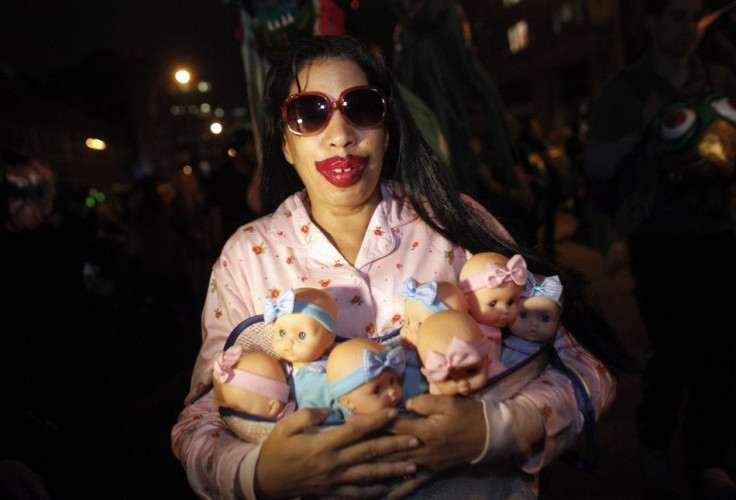Casey Anthony, Octomom Among the Most Disliked in America: Do We Hate the Right People?

Casey Anthony topped "The Most Hated Person in America" poll this week, further demonstrating that while the partying mom may have been acquitted of murdering her 2-year-old daughter Caylee, she will always be guilty in the court of public opinion.
The 25-year old Florida woman was cleared of murder charges in July, in a verdict that stunned and outraged the millions who were transfixed by her trial.
The survey published by E-Poll Market Research, an affiliate of Nielsen, found that 53 percent of the 1,100 respondents were aware of Anthony, and among those, 94 percent answered "total dislike" to describe their opinion of her.
Spencer Pratt of MTV's "The Hills" ranked just behind Anthony on the list (88 percent answered "total dislike"), and Octomom Nadya Suleman, at 87 percent, came in third.
Rounding out the top five are O.J. Simpson -- who, like Anthony, is widely believed to have been wrongly acquitted -- and Jon Gosselin, formerly of the TLC reality show "Jon & Kate Plus 8."
Author and journalist John Bowe, who profiled Suleman for The New York Times in January 2009, thinks that who we collectively hate says more about us than it does the targets of our vitriol.
While researching the story -- "The Octomom and Her Babies Prepare for Prime Time" -- Bowe spent time with Sulemen and her 14 children (the octuplets and their six siblings) in their Southern California home while a film crew documented them for a reality series.
Upon first getting to know her, he told himself, "Okay, so this woman's crazy, but there are millions of crazy people." Why do we fixate on Octomom?
"The hatred of [Suleman] exposed so much real misogyny," Bowe told IBTimes. "People hate a single mother," he said, noting that Suleman used a sperm donor and in vitro fertilization to conceive the octuplets. The Octomom's dependence on government assistance and apparent cosmetic surgery "made it okay to hate her," he added.
As the "Most-Hated" list illustrates (three of the top five have been on reality television), so-called ordinary people who actively pursue fame for something other than genuine (or any) talent set themselves up for public revulsion -- even while they are being rewarded with a rapt audience and material gain, often provided by the very same people who claim to despise them.
This seeming paradox, while conflated in origin, has become so predictable that an aspiring fame-seeker need look no further than a given evening's surplus of unscripted TV shows for a virtual handbook on how to manufacture (and maximize) his own 15 minutes. All he needs to offer is a willingness to be loathed.
Asked what he thought of Octomom's courtship of the press -- or was it the other way around? -- Bowe offered a variation of the chicken-and-egg analogy. He believes that Suleman was unconsciously seeking public recognition, got perhaps more than she bargained for, and then "used it as the only tool available to help her" support her oversized family.
Suleman herself called it "a Catch-22" when Bowe asked for the New York Times story why she allowed her family to be surrounded by cameras.
"I'm damned if I do what I need to do with the media to support my kids, and I'm damned if I don't. If I don't, I can't take care of them."
Some may be inclined to ask, then, how she planned on taking care of them without the spoils of infamy. Still, if Suleman's intentions may have been disingenuous, her love for her children seems to be very real.
"She was not faking her affection for her children," Bowe said. "That was the big surprise of the whole thing. I don't want to say she was a good mother, because I don't think anyone can be a good mother to 14 children, but her maternal impulse was as genuine as I've ever seen it."
Though very few could make a convincing argument that Suleman has made the best decisions for herself and her children, she and her family are the only real victims of her ill-advised parenting approach -- which means that she has directly injured the most people of those ranked in the top five on the "Most-Hated" list.
Regardless of whether these people have committed actual crimes (as two of them very likely have), for the general public (and the survey respondents), they are no more real than a character we might watch on scripted television.
True public enemies who pose a real and immediate threat to large segments of society -- dictators, war criminals and high-stakes hackers whose names are in the news right now -- appear to be absent from a certain segment of the collective consciousness even though their misdeeds have done and will do far more pervasive societal damage than the Spencer Pratts and the Octomoms of the world.
"There is nothing wrong with vehement hatred," Bowe said. "But it would be great if we hated the right people."
© Copyright IBTimes 2024. All rights reserved.






















